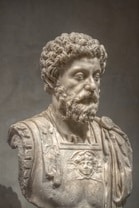Learning about Happiness from the Roman Emperors

I am sure many of my readers enjoy participating to off sites meetings where, together with peers and or colleagues, we learn how to improve the way we work together sharing collaboration, respect and common purposes. During a recent one I joined, near a famous former Roman city, Aosta, a slide was shown with a couple of sentences that really engaged me:
“When you arise in the morning, think of what a precious privilege it is to be alive – to breathe, to think, to enjoy, to love”.
If you are a people leader, a team lead or someone who influence other people’s life, spend a few minutes with me in reflecting what we can learn from one of the enlightened Roman Emperors: Marcus Aurelius (26 April 121 – 17 March 180 AD), called the Philosopher; he was Roman emperor from 161 to 180. He was the last of the rulers traditionally known as the Five Good Emperors.
The 18th-century historian Edward Gibbon, in his work The History of the Decline and Fall of the Roman Empire, opined that their rule was a time when “the Roman Empire was governed by absolute power, under the guidance of wisdom and virtue”. Gibbon believed these benevolent dictators (The Five Good Emperors) and their moderate policies were unusual and contrasted with their more tyrannical and oppressive successors.Gibbon went so far as to state: “If a man were called to fix the period in the history of the world during which the condition of the human race was most happy and prosperous, he would, without hesitation, name that which elapsed from the death of Domitian to the accession of Commodus. The vast extent of the Roman Empire was governed by absolute power, under the guidance of virtue and wisdom. The armies were restrained by the firm but gentle hand of four successive emperors, whose characters and authority commanded respect. The forms of the civil administration were carefully preserved by Nerva, Trajan, Hadrian and the Antonines, who delighted in the image of liberty, and were pleased with considering themselves as the accountable ministers of the laws. Such princes deserved the honour of restoring the republic, had the Romans of their days been capable of enjoying a rational freedom.”
Therefore Marc Aurelio was both a Happy and Servant Emperor and ruled in one of the happiest period of Roman history, according to Gibbon. Happiness of your team and Servant Leadership are very relevant and presented very well in todays management literature. The fact that a happy workforce is by far more productive and that the expectation of employees is to be served in their personal professional development journey, is becoming the base for every successful leader. A Servant Leader shares power, puts the needs of the employees first and helps people develop and perform as highly as possible. Servant leadership inverts the norm, which puts the customer service associates as a main priority. Instead of the people working to serve the leader, the leader exists to serve the people. As stated by its founder, Robert Greenleaf, a Servant Leader should be focused on “Do those served grow as persons? Do they, while being served, become healthier, wiser, freer, more autonomous, more likely themselves to become servants?”. When leaders shift their mindset and serve first, they benefit as well as their employees in that their employees acquire personal growth, while the organisation grows as well due to the employees growing commitment and engagement.
How Marc Aurelio became such a great leader? He spent time reflecting on the second sentence:
The happiness of your life depends on the quality of your thoughts
He wanted to lead, serving his country and his people, he wanted them to enjoy and appreciate the gifts they received everyday in their life, he drove the Empire to one of the happiest period. Everyday he was exercising what today we would call the positive thinking appreciating what he had, being humble in his ruling and building positive thoughts in his mind. It was not a surprise for me to discover, among many, an entrepreneur that thousand of years later had probably taken inspiration from The Philosopher, Andrew Carnegie who wrote :
“If you want to be happy, set a goal that commands your thoughts, liberates our energy, and inspires your hopes.”
Andrew Carnegie was a Scottish American industrialist who led the enormous expansion of the American steel industry in the late 19th century. He built a leadership role as a philanthropist for America and the British Empire. During the last 18 years of his life, he gave away to charities, foundations, and universities about $350 million (in 2011, $225 billion) – almost 90 percent of his fortune. His 1889 article proclaiming “The Gospel of Wealth” called on the rich to use their wealth to improve society, and it stimulated a wave of philanthropy.
Marc Aurelio was a practitioner of Stoicism. According to its teachings, as social beings, the path to happiness for humans is found in accepting the moment as it presents itself, by not allowing oneself to be controlled by the desire for pleasure or fear of pain, by using one’s mind to understand the world and to do one’s part in nature’s plan, and by working together and treating others fairly and justly. Marc Aurelio personal philosophical writings, which later came to be called Meditations, are a significant source of the modern understanding of ancient Stoic philosophy. They have been seen as one of the greatest works of philosophy. (see more here).
Across centuries leaders who cared about their team’s happiness have left a positive memory and heritage.




